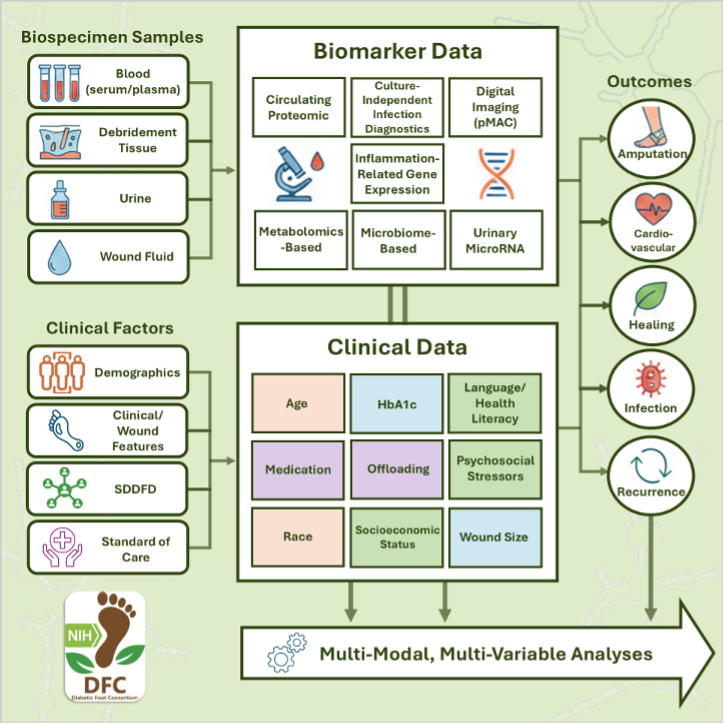Welcome to the Diabetic Foot Consortium

About the Diabetic Foot Consortium (DFC)
Diabetic foot ulcers are a common—and serious—complication of diabetes, often leading to infections and even amputations. In fact, foot ulcers are the leading cause of lower limb amputations in the U.S. The Diabetic Foot Consortium (DFC), supported by the National Institutes of Health (NIH), is the first nationwide network focused on studying diabetic foot ulcers and finding better ways to prevent and treat them.
The goal of the DFC is to build a foundation for clinical trials that will help improve wound healing and prevent amputations for the 27 million American adults living with diabetes. Up to 34% of people with diabetes will develop a foot ulcer in their lifetime, and about half of those ulcers may become infected. Each year, around 100,000 people with diabetes lose part of their lower limb because of complications from foot ulcers.
What Does the DFC Do?
The DFC brings together teams from across the country to study diabetic foot ulcers. We look for unique biological clues, or “biomarkers,” that may help predict how well a foot ulcer will heal and whether it might come back. Our research is designed to help answer important questions and provide better care for people living with active foot ulcers.
Our current study is a platform study designed to efficiently test multiple biomarkers to identify diabetic foot ulcers (DFUs), led by University of Michigan. This study is designed to be flexible so that is suitable for a wide range of studies relevant to individuals with open (active) DFUs. Our previous studies of which manuscripts are currently being written, focused on finding biological clues, called biomarkers, in people with diabetic foot ulcers that can guide treatment and predict how the ulcer will heal and the likelihood of an ulcer returning.
The first study of the DFC, led by Indiana University School of Medicine, tested whether body fluid leaking through the skin on a newly healed ulcer can predict how likely an ulcer might return. The second study, led by the University of Miami, tested whether the presence of or a change in specific cellular proteins in tissue samples from an ulcer can predict the likelihood of healing in the next 12 weeks.
The NIDDK, a component of the NIH, conducts and supports research on diabetes and other endocrine and metabolic diseases; digestive diseases, nutrition, and obesity; and kidney, urologic and hematologic diseases. Spanning the full spectrum of medicine and afflicting people of all ages and ethnic groups, these diseases encompass some of the most common, severe, and disabling conditions affecting Americans. For more information about the NIDDK, the NIH and SABER visithttp://www.niddk.nih.gov,https://www.nih.govandhttps://sph.umich.edu/saber/.
New NIH and NIDDK Funding Opportunity for New and Early Investigators. Please seeFor Potential Collaboratorstab for more information